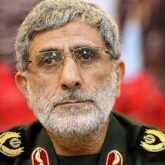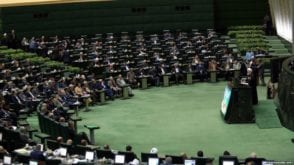Al-Monitor – Over the past week alone, Iran came out with two major announcements, claiming what it sees as significant gains against Israel, as the two sides battle it out on the intelligence front.
“They were once again humiliated,” a state television report said, as it narrated in detail how the intelligence department of Iran’s Defense Ministry had thwarted a sabotage plot against the country’s controversial missile industry. Iranian authorities said the purported plan involved introducing defective parts into missile manufacturing systems that could have grounded the production line. They linked the attempted sabotage to the Mossad, Israel’s overseas intelligence agency, and its local agents.
Admiration has been flowing in state-funded papers and media outlets ever since. “The largest military sabotage in 100 years tackled,” the headline of one conservative outlet read, while a string of TV shows brought in one spokesperson and expert after another to comment on and celebrate the “triumph.”
And it all occurred only within days of another statement by the intelligence apparatus that it had busted Israeli-led “terror” networks nationwide.
While the two announcements weren’t exactly novel, they highlighted Iran’s attempt to introduce itself as the winning side in the intelligence war, in which Iran has earlier been widely seen as the weaker party. The frequency and level of penetration of Israel-blamed intelligence operations inside Iran in the past 15 years have raised more than one eyebrow, from the assassination of top nuclear and missile experts to multiple sabotage operations meant to cripple nuclear facilities. However, by confidently propagating about the latest two “failed” attempts, Tehran wants to send a signal to the outside world that it is bouncing back and shifting the game in its favor.
The Islamic Republic is also finding itself in a better position amid the recent political crisis in Israel, where Prime Minister Benjamin Netanyahu has faced one of the most serious domestic challenges of his career amid a rapidly declining popularity rate over his controversial judicial reforms and his handling of the ensuing protests.
Thus, the image of a weakened government led by a politician — whose signature hawkish approach toward Tehran has only intensified over the years — is there as the best propaganda tool for Iranian authorities to exploit.
Further coming to the advantage of the Iranian side is the seemingly frosty ties between Netanyahu and US President Joe Biden’s administration, particularly in light of the Iran nuclear deal, also known as the Joint Comprehensive Plan of Action (JCPOA). Iran continues to argue that Netanyahu has been the boy who cried wolf with relentless warnings over Iran’s nuclear program. To them, the Israeli prime minister’s failure to bring the United States on board for a military strike on Iranian nuclear sites is an indication of his continued isolation.
To back up the assertion, Tehran references Washington’s willingness to keep open the window of nuclear diplomacy, shunning Israel’s request that no deal be clinched with Tehran to revive the JCPOA. The popular view in Tehran is that Netanyahu has failed to mobilize support against the Islamic Republic thanks to the growing rifts with Washington.
Despite the stalemate in JCPOA talks, Iran appears to be enjoying an unwritten settlement with the United States, in which at least a military strike is no worrisome, imminent threat. Expressing pride, Iranian authorities have also underscored how despite Israeli pressure, they have managed to ramp up nuclear enrichment, facing little or no punishment from the West, while even gaining leverage for more concessions in JCPOA talks.
Coupled with that is the recent detente with Saudi Arabia, which could not have come at a better time. Iran was in dire need of an opening amid international isolation due to its crackdown at home on the unprecedented unrest triggered by Mahsa Amini’s death Sept. 16, 2022, in police custody. For Tehran, the Saudi rapprochement lifted that burden off, at least temporarily, and proved emblematic also of Israel’s inability to rally regional Arab powers behind the idea of militarily attacking Iran.
Taking advantage of all those calculations, the Islamic Republic has in recent months also accelerated its ballistic and cruise missile program, introducing naval and hypersonic versions, all while inattentive to Western and Israeli criticism.
In almost all the unveiling ceremonies of those projectiles, Iranian commanders have ratcheted up the rhetoric, not shying away from threats against the Jewish state. They have openly detailed the capabilities of those missiles in successfully traveling the path to hit targets well inside Israeli territory.
“These are all [missiles] made to pinpoint Israel,” said the head of Iran’s missile program, Brig. Amir-Ali Gen Hajizadeh, as he confidently giggled while giving a tour to hard-line President Ebrahim Raisi inside a missile and drone exhibition last month.
 Shabtabnews In this dark night, I have lost my way – Arise from a corner, oh you the star of guidance.
Shabtabnews In this dark night, I have lost my way – Arise from a corner, oh you the star of guidance.



